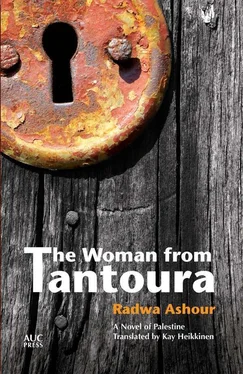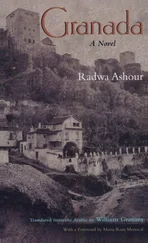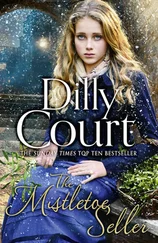Haifa fell, and two weeks later Abd al-Qadir al-Husayni was martyred. The whole village, not just the madafa, seemed to be a house open for mourning. It was an extended mourning, as Abd al-Qadir’s funeral — which I would not imagine or see in pictures until years later — would be held in Jerusalem after the mourners had heard the details of the massacre at Deir Yassin. Qastal fell and Abd al-Qadir was martyred defending it, and at dawn of the following day the attackers moved on neighboring Deir Yasin and slaughtered any of the residents they could. Three days later Safad fell, and after three more days, Jaffa. And three days after the fall of Jaffa, Acre fell. What happened in Safad? Its residents were twice our number and the people in our village said that it was inaccessible, located on four hills, and that the people were resolute — what happened that Safad fell in one night? Why did the garrison withdraw from it? And the Jordanian task force and the Syrian detachment, why did they withdraw? Where did the Liberation Army go? What dislodged the people from their houses? And could Acre possibly fall? How could Acre fall when it was Acre? These were not my questions, because I was only a girl of thirteen hearing what was repeated in a village that seemed like a time bomb, where the people were aware of the ticking that brought them closer to the explosion. But would it explode among us or among them? The young men were sure that it would explode among them. They said, “We have prepared ourselves and the rest is up to God.” They said that the Arab armies would enter the battle, that the Arabs would not let Palestine be lost. My father repeated what they said although he seemed less impulsive, or more precisely he seemed both impulsive and restrained by apprehensions which appeared only in his explosions. Since my brothers’ arrival from Haifa my father had included them in the guard duty shifts. Neither of them was trained in carrying arms; they trained for three days and then took shifts like the rest of the young men, one of them stationed at the school behind the railway east of the village, and the other toward the jail on the south side near the beach.
It’s hard for me now to convey the feelings of the townspeople, perhaps because then I was living in a state that my years did not permit me to comprehend. Perhaps I wondered like everyone else, when would our turn come? Perhaps like them I was clutching at straws, like the young men repeating that Ain Ghazal and Ijzim and Jabaa that were smaller than Safad and Jaffa and Acre, and that were guarded only by their inhabitants, had endured and turned away aggression time after time, and that like them we would turn away any attempt to capture our village. Will we be able to? I cut off the question and go to the sea. I crouch on the beach, watching the scene with my eyes.
The rocky islands were firmly anchored in place, and I was accustomed to the clamor of the waves and the movement of the sea foam and the spray. The sky would be clouds upon clouds, piled like thick blankets of dark blue or grays slipping into black, lightened suddenly by a spot of silver. The sea beneath would resemble the sky, divided between a deep, blackish blue and clearings of white. The waves would rise to the sky as if they were calling to it, speaking to it, or protesting that they were there; they would scud before it in a broad blessing of pure silver, dissolving gradually and mixing with a light gray blue that caressed the shore.
Or the sun would be setting, hanging in the rounded shape of an orange, as if when it descended a little it would not set in the west but rather would settle full and safe on one of the islands. The sky behind it had a strange color, descending gradually, easily, from a clear red to dark orange to an ambiguous color, neither brown nor the color of lead, which stealthily met the sea behind the islands. It left it for the sun to color the water in front of it, making it whatever color it pleased, making it a wondrous mirror, pink here and silver there, and making lines and clear spaces of leaden gray, the water rolling peacefully between the one and the other.
I did not think about what had been. I did not think about what was to come. Even the son of Ain Ghazal seemed far away, farther than the disc of the sun that was suspended before me.
My uncle announced that he was leaving. The house blazed.
They were close, more devoted than was usual even in a village where brothers were close to each other, close in where they lived and worked and in how they managed their lives. When they married they contracted for their brides on the same day and held the wedding on the same night, my father taking Zeinab and my uncle, two years younger, taking her sister Halima. My mother would say, “They’re like two peas in a pod.” Neither would do anything unless the other did it too. Even when they joined the rebels in 1936 they came and went together, and patrolled the village together. The day the British searched the house looking for weapons, and poured the oil in the gas and the gas on the olives and the flour and the lentils, they were looking for both of them. They asked for them by name and said they had information that they were hiding weapons. They had hidden the arms in the boat and the boat had been put to sea. My mother laughs, though it was not funny then, when the British soldiers invaded the house looking for the arms, and everyone knew the consequences: the price of a single rifle was a death sentence. My God! But she recalls the event and laughs, “We had hidden the rifles in the boat and the boat was put to sea.” Then she sighs, “After that God guided your father and he looked after the farming and stayed in town. But your uncle was one day in town and ten days traveling, a day in Haifa and a day in Sidon and a day in Beirut. Poor Halima, he had no useful work, not even a whiff.”
Did I love my uncle because he spoiled me? He would announce that I was dearer to his heart than the four boys, his two and his brother’s two. He would repeat, “Our Lord has been gracious to us and given us this girl, praise to the one who fashioned her.” He insisted that I go to school, and he surprised my father by wanting me to go to the teacher’s college in Jerusalem after I completed the sixth grade, the last one in the town school. At the time there was a quarrel between him and my father, but the earthquake was deferred; it did not occur until that night when my uncle announced that he was leaving.
“Shame on you, you’re leaving when the village is threatened and the young men are guarding it and preparing their weapons.”
“It’s no use!”
“If I didn’t know you as I know myself, I would say that you’ve given in to fear, like a woman.”
My uncle exploded. His voice seemed loud, but as he continued speaking it rose more and more until it reached the houses of the village and the beach beyond, and perhaps even the islands and the sea behind them.
“Haifa fell in two days, it went in two days , Abu Sadiq! I was there, and you know it. The city was besieged from all four sides, surrounded by ten settlements. And inside the city they lived on the mountain and we were on the plain, they had cannons and we had to be magicians to obtain weapons. Two hundred fifty rifles arrived from Syria and Rashid al-Hajj Ibrahim only got eighty-nine, because the rest were old and useless. He refused to accept them. And despite that we did all that we could, all that we could — for five months. Attack and retreat, bravery, martyrdom. And Haifa fell in two days! The villages are as scattered as beads from a rosary. Surur Burhum said to al-Hunayti that we would spend the night in Acre and make the road to Haifa safe for the weapons so as not to fall into an ambush. Al-Hunayti wanted to arrive quickly and talked on the telephone, and said, ‘We’re coming with the weapons.’”
Читать дальше












